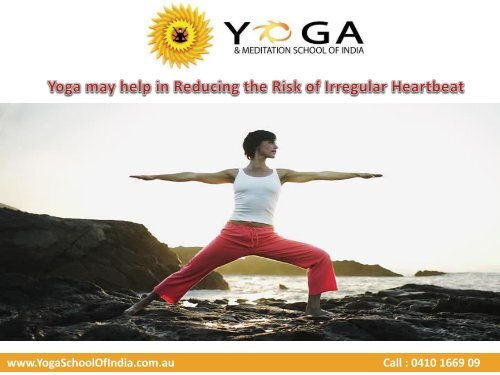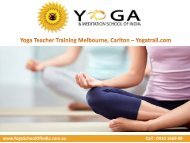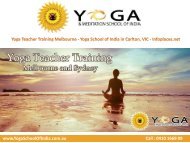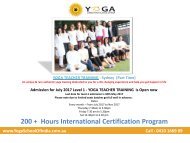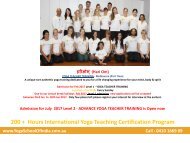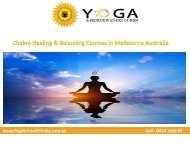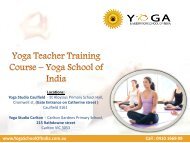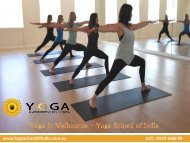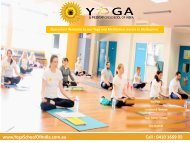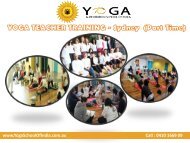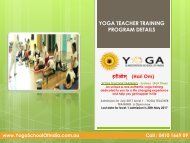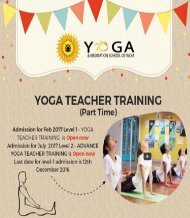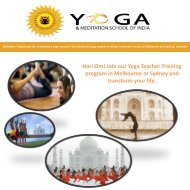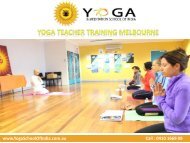Yoga may help in Reducing the Risk of Irregular Heartbeat
In its long history – and it is a very long history, first mentioned in 5000-year-old Vedic texts – yoga has been attributed to healing or ameliorating many things. In one of the main texts on yoga, Patanjali’s Yoga Sutras, yoga is described as “stilling the fluctuations of the mind”. And new research suggests that it could help reduce an irregular heart rhythm – stilling the fluctuations of the heart, if you will.
In its long history – and it is a very long history, first mentioned in 5000-year-old Vedic texts – yoga has been attributed to healing or ameliorating many things. In one of the main texts on yoga, Patanjali’s Yoga Sutras, yoga is described as “stilling the fluctuations of the mind”. And new research suggests that it could help reduce an irregular heart rhythm – stilling the fluctuations of the heart, if you will.
Create successful ePaper yourself
Turn your PDF publications into a flip-book with our unique Google optimized e-Paper software.
www.<strong>Yoga</strong>SchoolOfIndia.com.au Call : 0410 1669 09
In its long history – and it is a very long history, first mentioned <strong>in</strong> 5000-<br />
year-old Vedic texts – yoga has been attributed to heal<strong>in</strong>g or<br />
ameliorat<strong>in</strong>g many th<strong>in</strong>gs. In one <strong>of</strong> <strong>the</strong> ma<strong>in</strong> texts on yoga, Patajali’s<br />
<strong>Yoga</strong> Sutras, yoga is described as stillig <strong>the</strong> fluctuations <strong>of</strong> <strong>the</strong> id.<br />
And new research suggests that it could <strong>help</strong> reduce an irregular heart<br />
rhythm – still<strong>in</strong>g <strong>the</strong> fluctuations <strong>of</strong> <strong>the</strong> heart, if you will.<br />
Research carried out at <strong>the</strong> University <strong>of</strong> Kansas <strong>in</strong> <strong>the</strong> US has found that<br />
people who regularly practice yoga reduce <strong>the</strong>ir risk <strong>of</strong> atrial fibrillation.<br />
Not only that, but researchers also found that yoga reduced feel<strong>in</strong>gs <strong>of</strong><br />
anxiety and depression. For people at risk <strong>of</strong> atrial fibrillation, this comes<br />
as good news, as <strong>the</strong> only treatments currently available for <strong>the</strong><br />
condition <strong>in</strong>clude <strong>in</strong>vasive procedures or medication with unpleasant<br />
side effects.<br />
What is Atrial fibrillation?<br />
Atrial fibrillation is an abnormal heart rhythm – or irregular heartbeat –<br />
caused by unusual generation <strong>of</strong> electrical signals <strong>in</strong> <strong>the</strong> heart. Atrial<br />
fibrillation is a major cause <strong>of</strong> stroke <strong>in</strong> <strong>the</strong> aged. It is a common and<br />
potentially dangerous condition.<br />
Normal heart contractions start as an electrical impulse, produc<strong>in</strong>g a wave <strong>of</strong><br />
muscle contractions; <strong>the</strong> electrical activity spreads through <strong>the</strong> walls <strong>of</strong> <strong>the</strong><br />
atria and causes <strong>the</strong>m to contract, forc<strong>in</strong>g blood <strong>in</strong>to <strong>the</strong> ventricles. The atria<br />
and ventricles work toge<strong>the</strong>r, alternately contract<strong>in</strong>g and relax<strong>in</strong>g to pump<br />
blood through <strong>the</strong> heart.<br />
www.<strong>Yoga</strong>SchoolOfIndia.com.au Call : 0410 1669 09
Emotions, exercise, medications or fever can affect <strong>the</strong> rate at which <strong>the</strong> heart beats, but <strong>in</strong> atrial fibrillation can be<br />
caused by underly<strong>in</strong>g heart disease, or even excessive alcohol or caffe<strong>in</strong>e <strong>in</strong>take.<br />
This Study Shows Significant Impact<br />
The study <strong>in</strong>volved a small group <strong>of</strong> 49 patients who had never tried<br />
yoga before and had no physical limitations. They were monitored for<br />
six months – for <strong>the</strong> first three months <strong>the</strong> patients could do any<br />
physical activity <strong>the</strong>y liked, <strong>the</strong>n for <strong>the</strong> rema<strong>in</strong><strong>in</strong>g three months, <strong>the</strong>y<br />
were given a program <strong>of</strong> yoga asanas (postures), pranayama<br />
(breath<strong>in</strong>g exercises), meditation and relaxation.<br />
The patients did three yoga sessions a week and were encouraged to<br />
practice at home daily. The study monitored episodes <strong>of</strong> irregular<br />
heartbeat throughout <strong>the</strong> trial, and patients completed short surveys<br />
to assess <strong>the</strong>ir levels <strong>of</strong> anxiety, depression and overall quality <strong>of</strong> life.<br />
The study showed that <strong>the</strong> yoga program cut episodes <strong>of</strong> irregular heartbeat <strong>in</strong> half – a significant reduction – and<br />
also edued depessio ad aiet, ieased phsial fitess ad <strong>help</strong>ed <strong>the</strong> patiets’ soial futioig.<br />
The doctor <strong>in</strong> charge <strong>of</strong> <strong>the</strong> study, Dr Dhanunjaya Lakkireddy, said, It appeas oga has a sigifiat ipat o<br />
<strong>help</strong>ig to egulate patiets’ heateat ad ipoves <strong>the</strong> oveall ualit <strong>of</strong> life.<br />
Given <strong>the</strong> small size <strong>of</strong> <strong>the</strong> study, Dr Lakkireddy cautioned that larger studies need to be carried out to see if his<br />
f<strong>in</strong>d<strong>in</strong>gs are replicated. However, he also said that s<strong>in</strong>ce yoga is non-<strong>in</strong>vasive, low-cost, and confers a range <strong>of</strong> o<strong>the</strong>r<br />
physical and mental benefits, it should def<strong>in</strong>itely be considered as a complementary treatment <strong>of</strong> <strong>the</strong> condition.<br />
Source: Medical News Today
Thanks!<br />
<strong>Yoga</strong> Teacher: Samir Rane<br />
Mobile: 0410 166 909 | Email : <strong>in</strong>fo@yogaschool<strong>of</strong><strong>in</strong>dia.com.au<br />
Locations:<br />
<strong>Yoga</strong> Studio Caulfield - St Aloysius Primary School Hall,<br />
Cromwell st, (Gate Entrance on Ca<strong>the</strong>r<strong>in</strong>e street )<br />
Caulfield 3161<br />
<strong>Yoga</strong> Studio Carlton - Carlton Gardens Primary School,<br />
215 Rathdowne street<br />
Carlton VIC 3053<br />
www.<strong>Yoga</strong>SchoolOfIndia.com.au Call : 0410 1669 09


